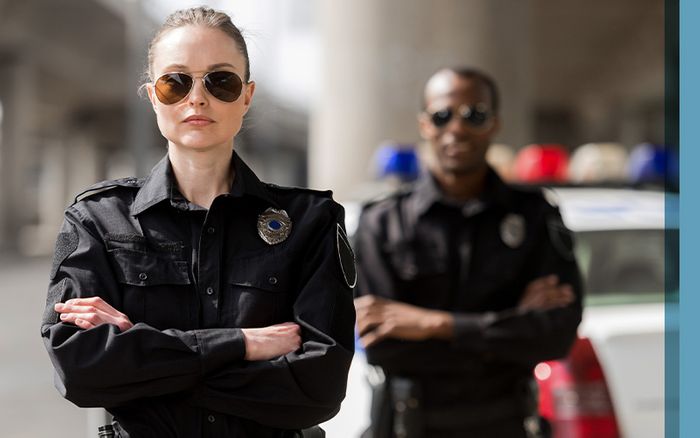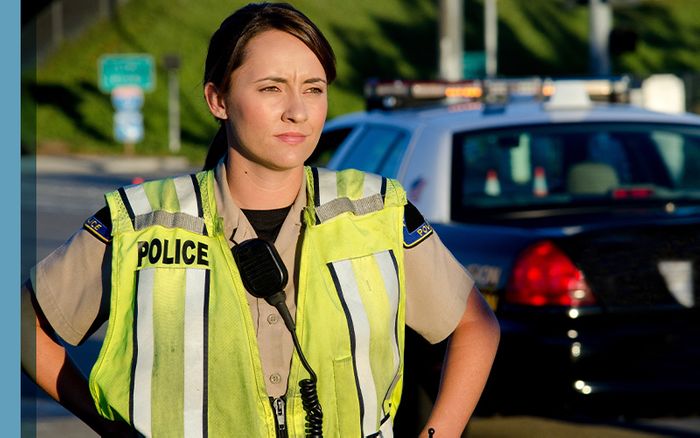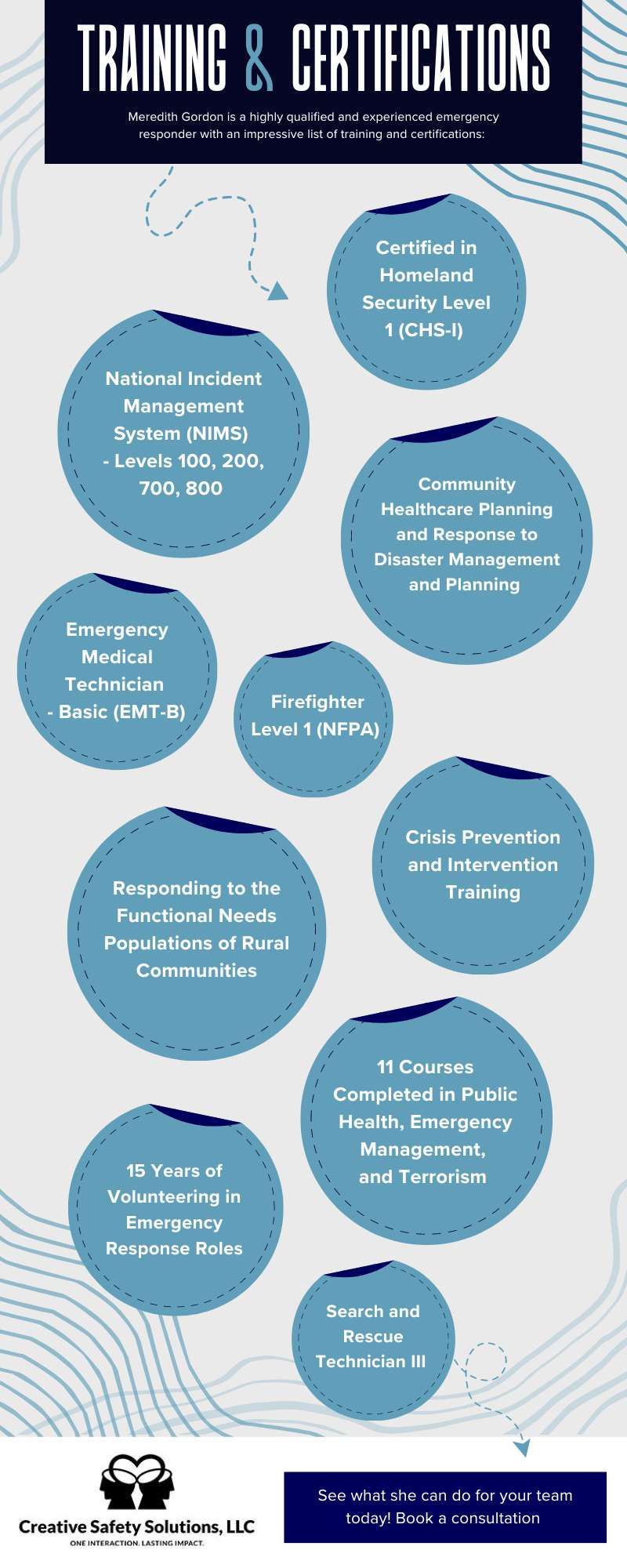ABOUT OUR FOUNDER
Bridging the Gap With Creative Safety Solutions
At Creative Safety Solutions, our mission is to bridge the gap between crisis response and community resources. Our founder, Meredith Gordon, brings a unique blend of expertise in emergency response, community outreach, and consultation. With a focus on effective crisis intervention resources and building strong connections with non-law enforcement resources, she strives to create a comprehensive vulnerable populations approach for your department that prioritizes community care in a creative manner. Let’s take a look at Meredith’s accomplishments and how she can help your organization grow.


ABOUT MEREDITH
Meredith Gordon has been an exceptional emergency responder with an impressive resume of training and certifications. With qualifications such as Homeland Security I (CHS-I), EMT-B, Firefighter 1 NFPA, Search & Rescue Technician III, and certifications in mental health and crisis intervention, Meredith is well-prepared to handle any emergency. With over 15 years of experience as a volunteer emergency responder and responding to over a thousand emergency calls, Meredith's expertise is unmatched. She has trained hundreds of emergency responders on crisis response techniques for dementia populations and has contributed to national emergency responder curricula and training videos. With extensive experience in community outreach, consultation, and investigation for defense and intelligence communities, Meredith brings knowledge and expertise to any emergency response team.
PROFESSIONAL POSITIONS
• COVID-19 Case Investigator & Contact Tracer: Investigated disease spread on behalf of a southwest state Department of Health.
• Technician on an Alcohol/Drug Detox Unit of a Hospital: Assisted patients going through the medical detox process.
• Oversaw the safety management program for the regional chapter of a non-profit organization providing support, services, and education to those affected by Alzheimer’s disease and related dementias: Trained hundreds of emergency responders on crisis response techniques for dementia populations at the local, state, and national conference levels. Contributor to national emergency responder curriculum and training video. Coordinated with a northeastern city police command staff to assist in overhauling the department’s missing person protocols for individuals with dementia; assisted with implementing a training curriculum for 6,000+ officers. Guided regional implementation and recruitment efforts for nationally based MedicAlert®+Safe Return®, a program partially funded by the U.S. Department of Justice, for those with dementia at risk for wandering and becoming lost; Assisted emergency responders during missing and found incidents 24/7/365 for hundreds of cases in a ten-year span.
• EMS Consultant: Sought by a public, state university, tasked with providing consultation on a statewide emergency responder training grant provided by a state Developmental Disabilities Council; Reviewed and edited training curriculum content to provide emergency responder perspective, language, and comments on the protocol.
• Mass Care Sheltering Exercise Evaluator: Co-led a regional exercise with government and private sector attendees. Participated in planning for the Papal Visit to Philadelphia as a member of a Regional Task Force- Functional Needs Sub-Committee.
• Community Outreach Manager for a Multiple Sclerosis organization: Collaborated with community resources that provided services, and care, to those afflicted by the disease. Met with patients in a Neurologist's office to connect them directly with resources that could assist in their care.
• Special Investigator: Executed 500+ federal background investigations for the defense and intelligence communities, to determine the suitability of individual access to sensitive and/or classified U.S. government information.

Shifting Strategies for Crisis Response: Building Community Resources & Treating Trauma as Key Solutions
Research has shown the importance of shifting strategies in crisis response. According to NPR's article on mental health and police violence, building community resources that can respond and take care of a crisis without law enforcement involvement can help prevent dangerous situations and foster better connections with individuals in crisis. Bruno, an expert in crisis intervention, emphasizes that building a non-law enforcement crisis response system can lead to more people connecting before it hits a dangerous level.

In the context of public mass shootings, data from the National Institute of Justice reveals that trauma is a common element in the backgrounds of those perpetrating such acts. Severe childhood trauma was found in 31% of individuals involved in mass shootings, and over 80% were in crisis. Early intervention through school-based services is seen as a key component in addressing trauma and potentially preventing mass shootings.
The Treatment Advocacy Center emphasizes that reducing the likelihood of police interaction with individuals in a psychiatric crisis can be the most immediate and practical strategy for reducing fatal police encounters. Due to the disproportionate volume of contact between individuals with serious mental illness and law enforcement, it is crucial to prioritize the development of effective community resources and alternative crisis response options.

Addressing Mental Health VIA Community Collaboration
Collaboration between law enforcement, homeless shelters, and community mental health systems is essential. NBC News reported on the importance of law enforcement developing connections with these entities to ensure effective community engagement and support for individuals in crisis. Kimball, an advocate for police reform, highlighted the need for everyone to work together to address mental health issues in the community.

The Washington Post's police shootings database reveals a slight increase in the number of fatal police shootings in recent years. Notably, approximately 20% of victims were in a mental health crisis at the time of the incidents, underscoring the urgent need for improved crisis response strategies.
Innovation in the field of emergency response includes initiatives that bring social work skills to law enforcement and public safety. A collaborative effort by the University of Southern California (USC) aims to integrate social work expertise into law enforcement practices, facilitating effective crisis intervention and support for vulnerable populations.
Creative Safety Solutions: Bridging the Gap Between Crisis Response & Community resources
By focusing on building community resources and addressing trauma as key solutions for crisis response, Meredith Gordon and Creative Safety Solutions are dedicated to bridging the gap between crisis response and community resources. Through Meredith's expertise and experience in emergency response, community outreach, and consultation, she works to create a comprehensive crisis response system that prioritizes community care and safety. By shifting strategies and fostering collaboration between law enforcement and community resources, Creative Safety Solutions strives to create a more effective and compassionate approach to crisis intervention.

